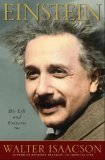Book Review: Einstein: His Life and Universe

Einstein: His Life and Universe
My rating: 4 of 5 stars
Everyone knows Albert Einstein–smart man, came up with E=MC2, helped create the atomic bomb–but I didn’t know much beyond the hype. That’s why I picked up Walter Isaacson’s award-winning book Einstein: His Life and Universe (Simon and Schuster 2007). I like to read about smart people. What’s different in how they think than other people? Can they relate to ordinary individuals? Where do they get the amazing ideas they come up with?
As often as not, brilliant people become criminals as successes. That tells me intelligence isn’t the magic bullet to success in the world we-all live in. Someone who is charismatic, friendly, likeable, with good-enough brains is actually more likely to succeed than an individual whose brain never shuts off.
Turns out, that was true for Albert Einstein. This man–whose name equates to the definition of ‘genius’–had a childhood nothing like what we’d expect. The Child Einstein should have been revered for his thinking skills, but it turns out he had the same problems as you and I, including getting along with people, finding a date and struggling in academic classes because his brain didn’t fit into the teacher’s pedagogic box.
And finding a job. He should have been welcomed into an academic setting, or the labs of a big company coming up with the Next Great Invention, but his ideas often challenged conventional thinking and as such, were rejected by those in control. Finally, he took a job in the patent offices and found he loved it–not because of the work, but because it left him time to think. Here, he let his brain fly through what could be if we understood the Universe. Einstein was a theoretician, which meant he came up with ways to solve problems that were invisible–based on formulas and physics–rather than drawn from what he saw in the world around him.
From the safety of the government job, Einstein researched, ruminated, wrote articles on his findings and tenaciously lobbied anyone who would listen to his conclusions. That tenacity is what won in the end. Tenacity, I’m happy to tell you, is a trait anyone can develop. You don’t need to be a genius. How many parents rail on their kids to never give up, don’t be a quitter, to the last man standing goes the spoils.
Isaacson gently shares the details of Einstein’s later life, when he accomplished little and seemed confused over his direction in life, adamant about his beliefs, but not sure where to take them when he could find little support.
Overall, Einstein’s story is a lesson for all of us. He had a God-given talent to think better than anyone in his generation, but it was the very human traits of tenacity and perseverance that enabled his success and the inability to see the forest for the trees that mitigated it in the end and his inability to see the world through others’ eyes that marked his intellectual demise. A worthy story for all, as much biography as lessons in how to live an extraordinary life. You’ll have to engage your own tenacity as the book is a raucous 675 pages–not for the faint of heart.
More book reviews on smart people:
American Sniper by Chris Kyle
Born on a Blue Day by Daniel Tammett
Galloping Ghost: the extraordinary life of Gene Fluckey by Carl Lavo
Jacqui Murray is the author of dozens of books (on technology in education) as well as the popular Building a Midshipman , the story of her daughter’s journey from high school to United States Naval Academy. She is webmaster for six blogs, an Amazon Vine Voice book reviewer, a columnist for Examiner.com and TeachHUB, Editorial Review Board member for Journal for Computing Teachers, monthly contributor to Today’s Author and a freelance journalist on tech ed topics. In her free time, she is editor of technology training books for how to integrate technology in education. Currently, she’s editing a techno-thriller that should be out to publishers next summer
Filed under: book reviews Tagged: EINSTEIN, smart search





